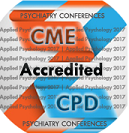
Nidesh Sapkota
B P Koirala Institute of Health Sciences, Nepal
Title: Anxiety, depression and quality of life in mothers of intellectually disabled children (Mental Retardation)
Biography
Biography: Nidesh Sapkota
Abstract
Background: Studies have shown that there is an association between anxiety and depression in mothers of children having intellectual disability with poor quality of life (QOL) in mothers of such children.
Objectives: The objectives of the study are: 1. To describe the clinico-socio-demographic profile of mothers of intellectually disabled children. 2. To investigate the relationship among anxiety and depression with quality of life in mothers with intellectually disabled children.
Materials & Method: Mothers (N=31) whose children's IQ score was below 70, were enrolled in to the study with their informed consent. Depression and anxiety disorders were diagnosed as per ICD 10. Severity of depression was measured with BDI and anxiety symptoms with STAI. WHOQOL-BREF was used to assess quality of life. The relationship among anxiety, depression and QOL were analyzed using diagonal matrix, ANOVA and Pearson correlation test.
Results: The mean age of participants was 50.23 (SD=6.11), BDI score was 13.65 (SD=11.301), STAI score was 53.90 (SD=15.821), and WHOQOL-BREF in all four domains was 290.90 (S.D=49.42). There was significant correlation between BDI and STAI (P=0.01, r:0.651) and the three domains of WHOQOL-BREF (P=0.01, r:0.821, 0.843, 0.635 respectively) scale except environment domain. Among the participants, 48.4% (ICD 10) had depression of varying degree along with 54.8% depression as per BDI cut off score. Anxiety disorder was seen in 22.6% as per ICD 10 but as per STAI, it was 53.90 (SD=15.821) which was statistically significant (p:0.01, r:-0.507). Depression when compared with no diagnosis persons has poor quality of life in WHOQOL-BREF physical domain (p:0.002) but when compared to anxiety or both, it was not statistically significant.
Conclusion: The findings of this study revealed that mothers of children having intellectual disability have high level of anxiety and depression which indeed had impact on quality of life.

